Top Rankings
Nevada Comm School District ranks among the top 20% of public school district in Iowa for:
Category
Attribute
Graduation Rate
Highest graduation rate (Top 5%)
For the 2025 school year, there is 1 public middle school serving 421 students in Nevada Comm School District. This district's average middle testing ranking is 7/10, which is in the top 50% of public middle schools in Iowa.
Public Middle School in Nevada Comm School District have an average math proficiency score of 71% (versus the Iowa public middle school average of 64%), and reading proficiency score of 77% (versus the 71% statewide average).
Minority enrollment is 19% of the student body (majority Hispanic), which is less than the Iowa public middle school average of 25% (majority Hispanic).
Overview
This School District
This State (IA)
# Schools
3 Schools
376 Schools
# Students
1,570 Students
127,807 Students
# Teachers
107 Teachers
8,868 Teachers
Student : Teacher Ratio
15:1
15:1
District Rank
Nevada Comm School District, which is ranked within the top 50% of all 325 school districts in Iowa (based off of combined math and reading proficiency testing data) for the 2021-2022 school year.
The school district's graduation rate of 95% has increased from 90-94% over five school years.
Overall District Rank
#103 out of 327 school districts
(Top 50%)
(Top 50%)
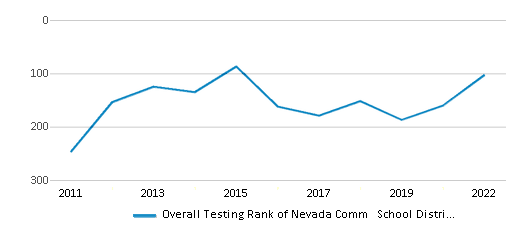
Math Test Scores (% Proficient)
69%
64%
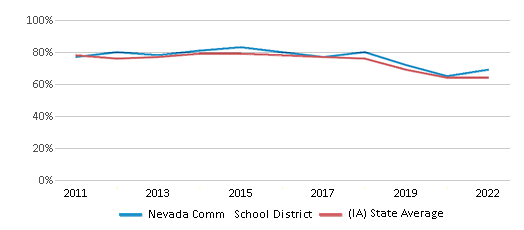
Reading/Language Arts Test Scores (% Proficient)
79%
70%
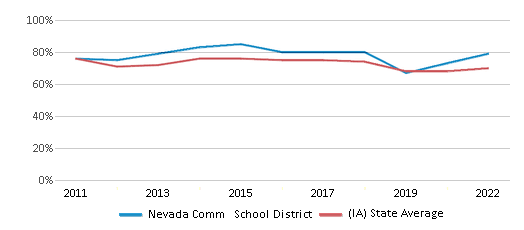
Science Test Scores (% Proficient)
67%
63%
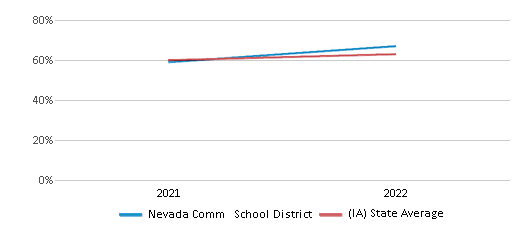
Graduation Rate
≥95%
90%
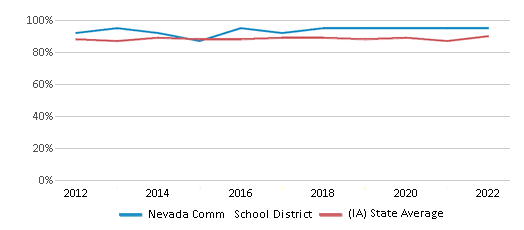
Students by Ethnicity:
Diversity Score
0.31
0.43
# American Indian Students
1 Student
711 Students
% American Indian Students
n/a
n/a
# Asian Students
11 Students
2,758 Students
% Asian Students
1%
2%
# Hispanic Students
167 Students
14,712 Students
% Hispanic Students
11%
11%
# Black Students
14 Students
7,560 Students
% Black Students
1%
6%
# White Students
1,294 Students
95,300 Students
% White Students
82%
75%
# Hawaiian Students
n/a
746 Students
% Hawaiian Students
n/a
1%
# Two or more races Students
80 Students
5,934 Students
% of Two or more races Students
5%
5%
Students by Grade:
# Students in PK Grade:
99
157
# Students in K Grade:
127
170
# Students in 1st Grade:
91
177
# Students in 2nd Grade:
99
171
# Students in 3rd Grade:
109
167
# Students in 4th Grade:
121
559
# Students in 5th Grade:
84
5,544
# Students in 6th Grade:
117
24,308
# Students in 7th Grade:
105
36,022
# Students in 8th Grade:
115
37,018
# Students in 9th Grade:
120
8,339
# Students in 10th Grade:
128
5,155
# Students in 11th Grade:
123
5,047
# Students in 12th Grade:
132
4,973
# Ungraded Students:
-
-
District Revenue and Spending
The revenue/student of $14,946 in this school district is less than the state median of $16,468. The school district revenue/student has stayed relatively flat over four school years.
The school district's spending/student of $15,488 is less than the state median of $16,042. The school district spending/student has stayed relatively flat over four school years.
Total Revenue
$24 MM
$8,262 MM
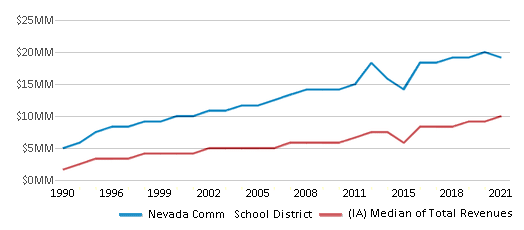
Spending
$24 MM
$8,048 MM
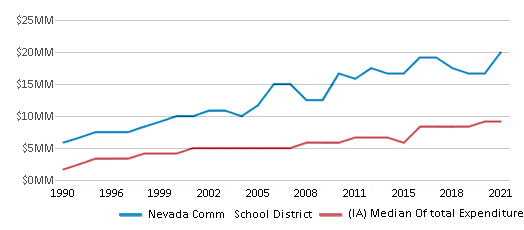
Revenue / Student
$14,946
$16,468
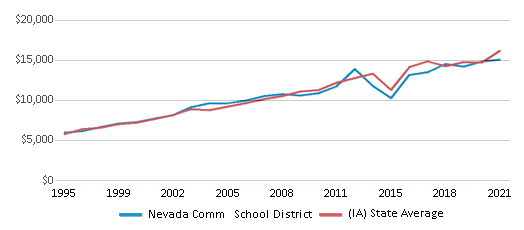
Spending / Student
$15,488
$16,042
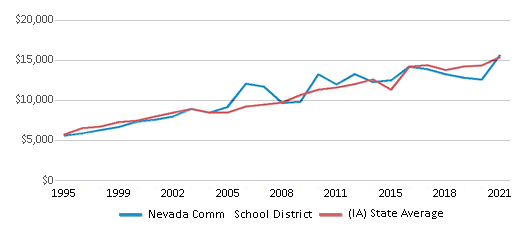
Best Nevada Comm School District Public Middle Schools (2025)
School
(Math and Reading Proficiency)
(Math and Reading Proficiency)
Location
Grades
Students
Rank: #11.
Nevada Middle School
(Math: 71% | Reading: 77%)
Rank:
Rank:
7/
Top 50%10
1035 15th St
Nevada, IA 50201
(515) 382-2751
Nevada, IA 50201
(515) 382-2751
Grades: 5-8
| 421 students
Recent Articles

Year-Round Or Traditional Schedule?
Which is more appropriate for your child? A year-round attendance schedule or traditional schedule? We look at the pros and cons.

Why You Should Encourage Your Child to Join a Sports Team
Participating in team sports has a great many benefits for children, there is no doubt. In this article you will learn what those benefits are.

White Students are Now the Minority in U.S. Public Schools
Increasing birth rates among immigrant families from Asia and Central and South America, combined with lower birth rates among white families, means that for the first time in history, public school students in the United States are majority-minority. This shift in demographics poses difficulties for schools as they work to accommodate children of varying language abilities and socio-economic backgrounds.





